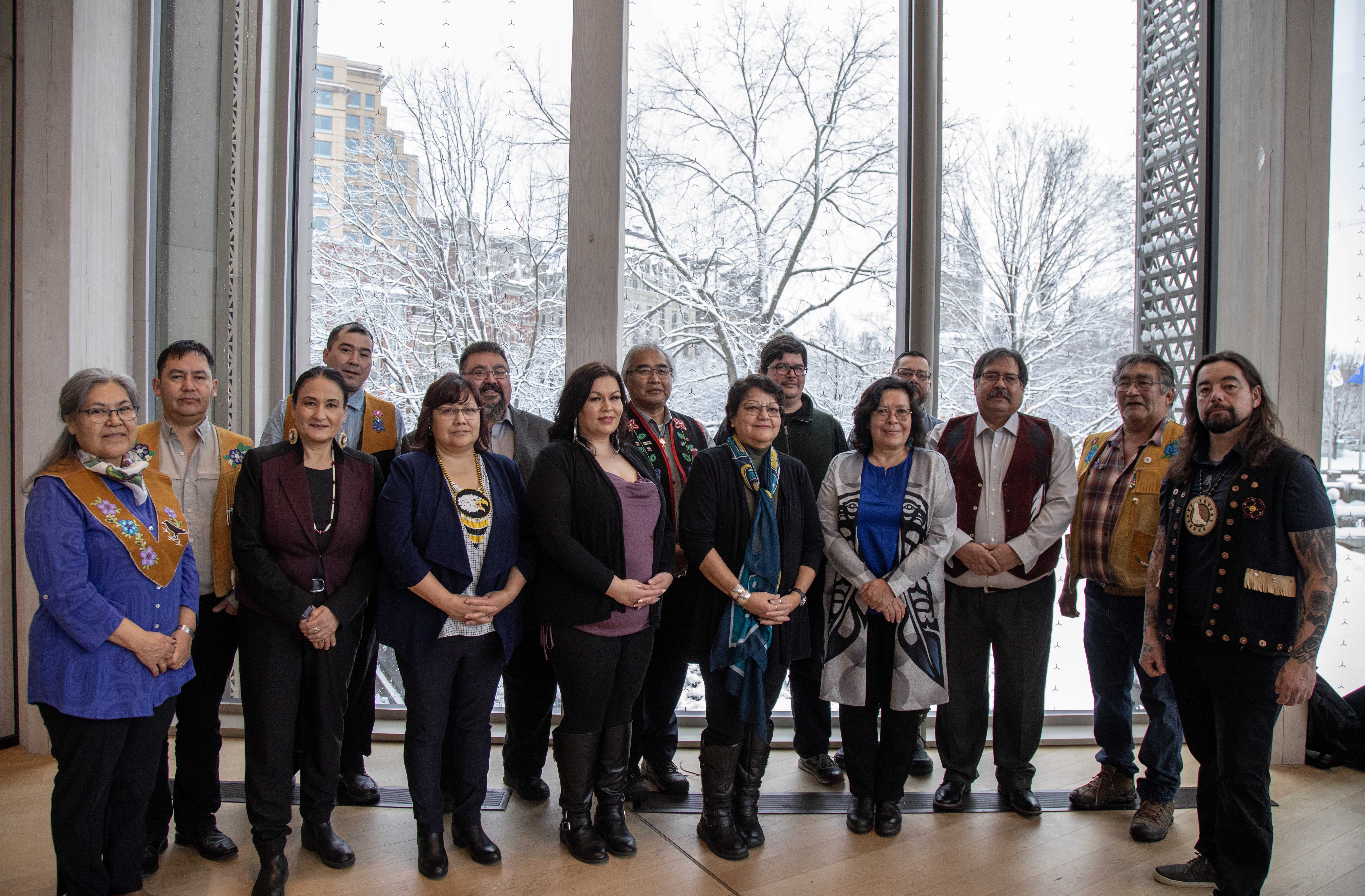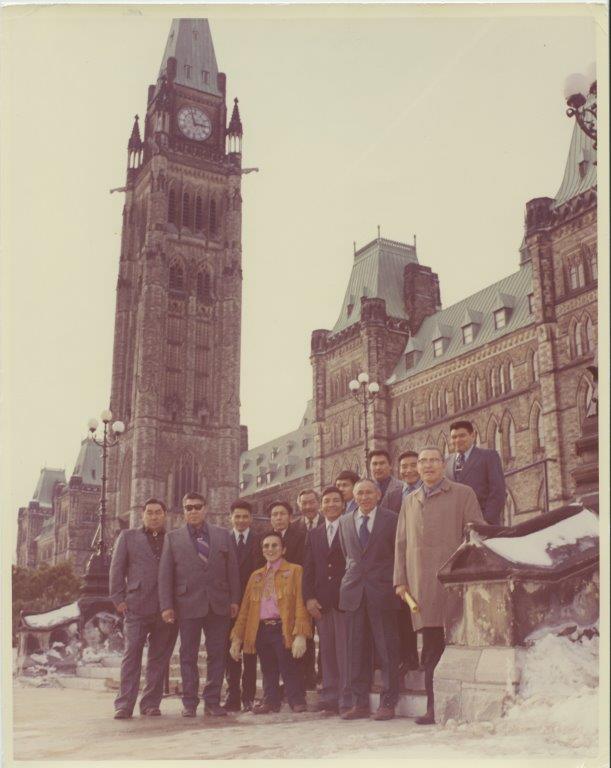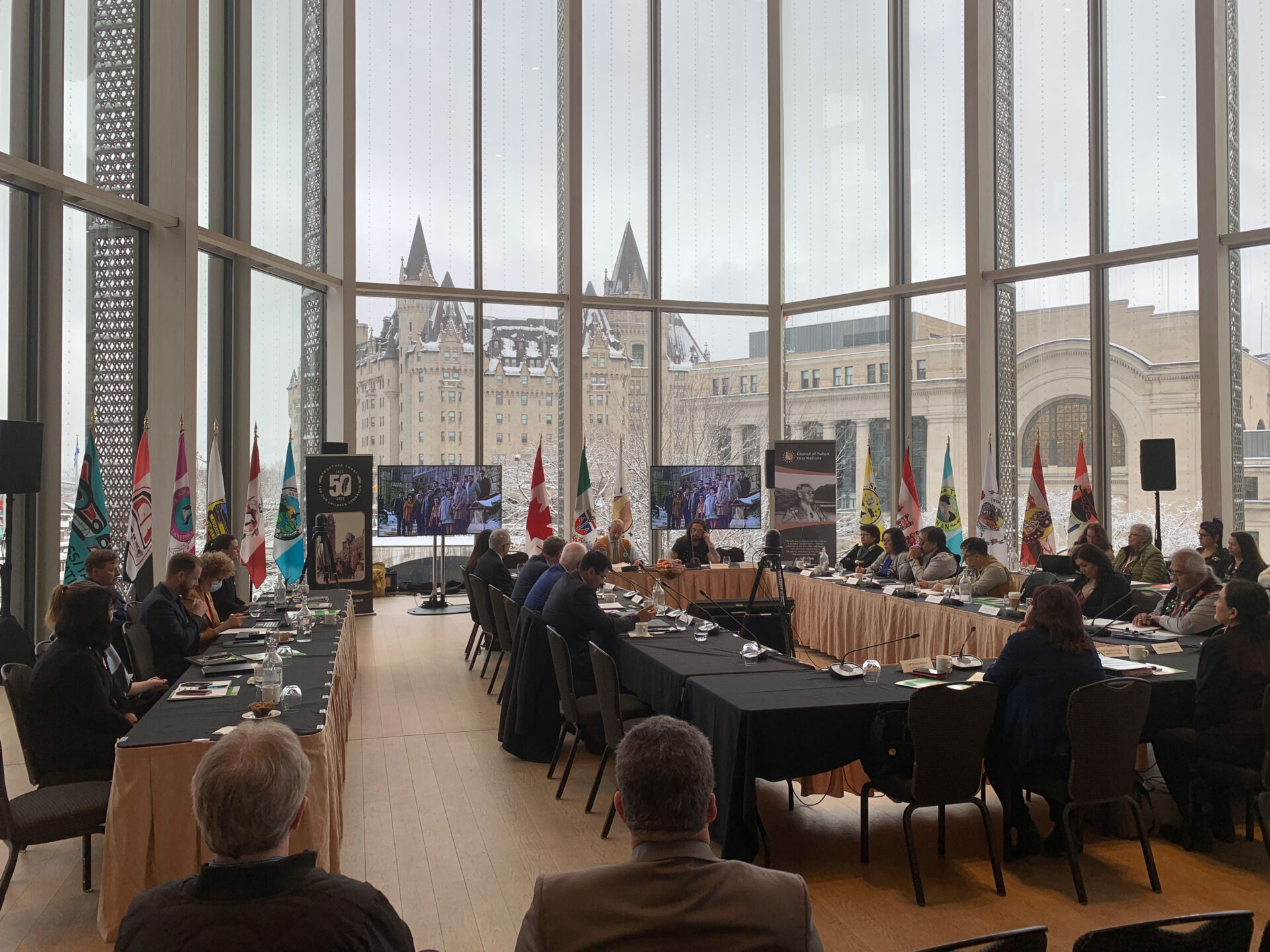Fifty years ago, Yukon First Nations leaders travelled to Ottawa to meet with then Prime Minister Pierre Elliott Trudeau and deliver an approach that would change nation-to-nation relationships with the Government of Canada. The ground-breaking document Together Today for our Children Tomorrow was the start of the Modern Treaty process in the Yukon. Today, Yukon First Nations leaders again gather in Ottawa, as heads of their elected governments, to meet on a government-to-government basis with Yukon and Canada.
Leaders representing Yukon First Nations, the Yukon, and Canada met at the Intergovernmental Forum in Ottawa to advance common priorities including affordable housing, homelessness, health and mental wellness, land use planning, language revitalization, emergency preparedness, financial agreement renewals, and declining salmon stocks.
Attendees included Yukon First Nations Chiefs and leaders, the Council of Yukon First Nations Grand Chief Peter Johnston, Yukon Premier Ranj Pillai and Yukon Ministers, the Honourable Dan Vandal, Minister of Northern Affairs, Minister responsible for Prairies Economic Development Canada and Minister responsible for the Canadian Northern Economic Development Agency; the Honourable Gary Anandasangaree, Minister of Crown-Indigenous Relations; and the Honourable Patty Hajdu, Minister of Indigenous Services.
Since its inception in 2002, the Intergovernmental Forum was established to help strengthen relationships and discuss the implementation of Yukon First Nation Final and Self-Government Agreements and issues of mutual concern.
We respect and understand Indigenous leaders and communities know best what they need, and we are committed to being there to support them.
Today, the Council of Yukon First Nations, the Government of Yukon, and the Government of Canada have signed a trilateral Letter of Intent to confirm their commitment to collectively work toward construction and operation of a Yukon First Nations led Healing Centre.
Quotes
“As we convene in Ottawa, we honour the legacy of our predecessors who, 50 years ago, laid the groundwork for the modern treaty process in the Yukon. Today, as leaders of our nations, we gather in the common interest of forging stronger government-to-government relationships with Canada and the Yukon. Discussions at this Intergovernmental Forum exemplify our commitment to implementing the Yukon First Nation Final and Self-Government Agreements, addressing mutual concerns, and securing a prosperous future for our communities. Together, we navigate the complexities of land-use planning, Indigenous housing, health, justice, and cultural revitalization, mindful of the responsibility we bear for the future of our children.”
-Grand Chief Peter Johnston, Council of Yukon First Nations
“The Government of Yukon deeply values the opportunity to meet collectively with federal ministers alongside Yukon First Nations Chiefs. We know our voices are stronger together. We discussed how we can take collective action on issues including land use planning, declining salmon populations, mental wellness, substance use, community safety, housing, emergency planning, and Indigenous language revitalization. With close to half of Canada’s modern treaties, the Yukon’s governance context is unique in Canada. The Intergovernmental Forum is a valuable opportunity to discuss how federal funding and programs meet this reality, and incorporating it within our Yukon Days outreach during the 50th anniversary of Together Today for our Children Tomorrow sends a strong signal of our intent to continue moving these discussions forward.”
-The Honorable Ranj Pillai, Premier of Yukon
“Land use planning is an integral part of the Yukon Final Agreements. Use of – and protection of – the land was a driving force behind Yukon First Nations agreements. We have not lost sight of this, and we will continue to work together to make more land use plans a priority.”
-The Honourable Dan Vandal, P.C., M.P., Minister of Northern Affairs
“Through Yukon First Nations’ unwavering persistence and dedication, a truly unique governance structure in the territory now exists. Today, we celebrate that achievement and redouble our shared efforts to make life better for First Nations in the Yukon through our nation-to-nation relationships.”
– The Honourable Gary Anandasangaree, Minister of Crown-Indigenous Relations
“Led by and for First Nations, we are taking the next steps forward to a self-determined future where healing happens. We will continue to support First Nations as they lead the way in designing the healing programs and services that work for them.”
-The Honourable Patty Hajdu, Minister of Indigenous Services
Quick facts
- Established in 2002, the Intergovernmental Forum provides an opportunity for Yukon First Nations, the Government of Yukon, and the Government of Canada with Modern Treaties to discuss areas of mutual interest and advance intergovernmental relationships.
- Regularly in December, the Government of Yukon and Yukon First Nations travel to Ottawa to meet with federal leaders to address regional priorities during Yukon Days.
- Nearly half of Canada’s Modern Treaties are in the Yukon. Eleven of the 14 First Nations in the Yukon have signed Final and Self-Government Agreements with the governments of Canada and Yukon and have jurisdiction in many areas of local and territorial responsibility. The parties work together on implementing the agreements in many areas, including regional land use planning.
- Supporting Indigenous leadership and co-developing solutions in Northern communities for First Nations, Inuit and Métis is central to advancing the reconciliation journey and self-determination.
- Investments made in and since Budget 2022 to advance reconciliation, protect the environment, and build stronger and more inclusive communities across Canada include:
- $4.9 billion to enhance and reform services for Indigenous children, expand Indigenous-led mental wellness services, and support communities as they respond to and heal from the ongoing impact of residential schools;
- $4.3 billion over seven years to build and repair housing in Indigenous communities, including those who are self-governing and Modern Treaty holders;
- $1.6 billion over five years, starting in 2023-24, to implement Canada’s first National Adaptation Strategy; and
- $1.1 billion over seven years, starting in 2023-24, to conserve and protect nature in Canada and around the world, including $800 million to support up to four Indigenous-led conservation initiatives.
Associated links
Together Today for our Children Tomorrow
Budget 2023: A Made-in-Canada Plan: Strong Middle Class, Affordable Economy, Healthy Future
For more information, media may contact:
Carson Debert
Press Secretary
Office of the Honourable Dan Vandal
Minister of Northern Affairs, Minister responsible for Prairies Economic Development Canada and Minister responsible for the Canadian Northern Economic Development Agency
carson.debert@nullrcaanc-cirnac.gc.ca
Joanna Sivasankaran
Director of Communications
Office of the Honourable Gary Anandasangaree
Minister of Crown-Indigenous Relations
joanna.sivasankaran@nullrcaanc-cirnac.gc.ca
CIRNAC Media Relations
RCAANC.Media.CIRNAC@nullsac-isc.gc.ca
819-934-2302
Jordan Owens
Cabinet Communications, Government of Yukon
867-332-0615
jordan.owens@nullyukon.ca
Lael Lund
Communications, Council of Yukon First Nations
867-335-3227
communications@nullcyfn.net

Yukon First Nations Chiefs in Ottawa on the 50th anniversary of Together Today for our Children Tomorrow. (left to right)
Yukon Assembly of First Nations Proxy Chief Mary Jane Jim;
Kwanlin Dun First Nation Chief Sean Smith;
Vuntut Gwitchin First Nation Chief Pauline Frost;
Vuntut Gwitch’in First Nation Councillor Hal Frost Jr.
Selkirk First Nation Chief Sharon Nelson;
former Champagne and Aishihik First Nations Chief Steve Smith,
Ta’an Kwäch’än Council Chief Amanda Leas,
Teslin Tlingit Council Chief Eric Morris,
Carcross/Tagish First Nation Deputy Chief Darla-Jean Lindstrom;
Teslin Tlingit Council Deputy Chief Alex Oakley;
Champagne and Aishihik First Nations Chief Barb Joe;
Trʼondëk Hwëchʼin Chief Darren Taylor;
Kluane First Nation Chief Bob Dickson,
Former Champagne and Aishihik First Nations Chief James Allen
CYFN Grand Chief Peter Johnston

Delegation of Yukon First Nations Chiefs in Ottawa; 1973
Front row left to right:
Chief Johnnie Smith (Whitehorse Indian Band)
Chief Charlie Abel (Old Crow Indian Band)
Chief Danny Joe (Selkirk Indian Band)
Chief Ray Jackson (Champagne & Aishihik Indian Band)
Chief Percy Henry (Dawson Indian Band)
Chief George Billy (Carmacks Indian Band)
Yukon Native Brotherhood President Elijah Smith
Second row (behind Ray Jackson):
Chief Jimmy Enoch (Kluane Indian Band)
Chief Dan Johnson (Carcross Indian Band)
Chief Clifford McLeod (Ross River Indian Band)
Chief Dixon Lutz (Liard First Nation)
Chief Sam Johnston (Teslin Indian Band)
Chief Peter Lucas (Mayo Indian Band)

